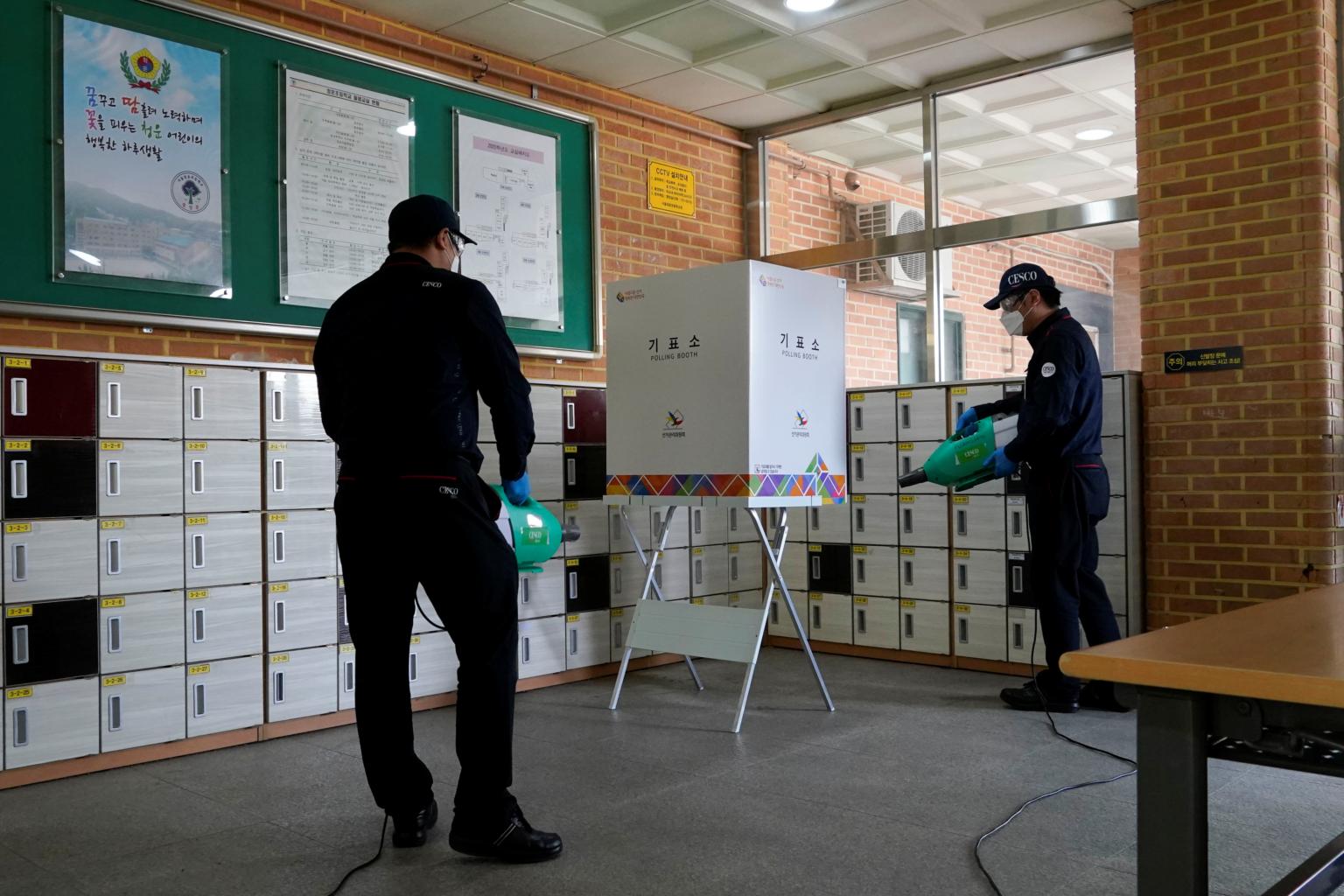Coronavirus: South Korea's election may provide model for other leaders
Sign up now: Get ST's newsletters delivered to your inbox

Employees from a disinfection service company sanitise a polling booth in Seoul, South Korea, on April 14, 2020.
PHOTO: REUTERS
Follow topic:
SEOUL (BLOOMBERG) - South Korea is holding the biggest election since the coronavirus pandemic spread around the globe - and it might spur other world leaders with good poll numbers to follow suit.
Surveys show President Moon Jae-in's Democratic Party of Korea set to win elections for 300 parliament seats on Wednesday (April 15), after his government's popularity increased following its handling of the virus in what was initially one of the world's hardest-hit countries. New infection rates have fallen this month to their lowest levels since February.
The decision to hold the election contrasts with some US states that have delayed presidential primaries and France, which suspended some local elections after cases began to multiply. Poland plans to conduct its May 10 presidential election by mail-in ballot.
Still, for any leaders weighing whether to call an election - such as those in Singapore and Japan - a big win for Mr Moon's party could show the political benefits of moving ahead with a vote despite the risks.
The virus provided an opportunity for Mr Moon to rebuild support battered by an economic slowdown, corruption scandals involving presidential aides and resurgent tensions with North Korea.
South Korea's election shows the world that holding a vote during the pandemic is both possible and may be beneficial for leaders who have handled the crisis well, according to Mr Miha Hribernik, head of Asia risk analysis at consultancy Verisk Maplecroft.
"Voters are likely to forgive previous transgressions and reward a decisive crisis response," he said. "Unfortunately, we believe South Korea is currently one of the rare exceptions to the rule. Most countries have mishandled their initial response to the pandemic, and many world leaders face a reckoning at the polls over the coming years."
North Korea, which has a history of stirring tensions when South Koreans go to the polls, fired multiple missiles from its eastern coast Tuesday, in a show of military might.
South Korea is taking precautions to keep voters safe: They will be required to stand at least one metre apart, cover their faces, wear disposable gloves and be ready to submit to temperature checks, while voting booths will be frequently disinfected.
Voting was expected to end at 6pm and exit poll results were planned for release a few minutes after that. A Gallup Korea poll released last week, before restrictions on publishing poll results took effect Thursday, showed that the Democratic Party was leading the opposition 41 per cent to 23 per cent.
Still, the complexity of South Korea's vote and a history of surprises make predictions difficult. Even just months ago, Mr Moon had faced criticism for a lax approach after the pandemic began in neighbouring China. He predicted then the virus would be terminated "before long" - only to see cases spike days later.
Postponing the election would have been a worrisome precedent in South Korea's three decade-old democracy, with many Mr Moon supporters being among those who took to the streets in the 1980s to end autocratic rule.
"South Koreans have been traumatised by living under the authoritarian regimes of the past and see elections as essential," said Ms Duyeon Kim, a senior adviser for North-east Asia at the International Crisis Group. "Not even the Korean War stopped them from voting in the 1952 presidential race or the H1N1 influenza outbreak in 2009 by-elections."
More than 1,100 candidates from 21 political parties have signed up for 253 constituencies with direct elections. Another 300 candidates are fighting for 47 seats decided by support for the parties.

